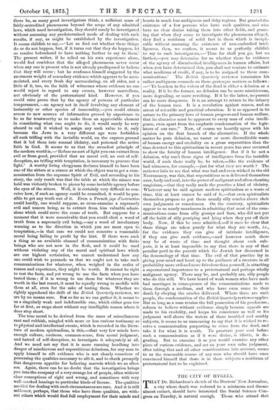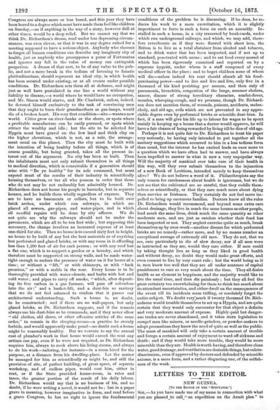THE CITY OF HYGEIA.
THAT Dr. Richardson's sketch of the Doctors' New Jerusalem, a city where death was reduced to a minimum and disease almost extinct, should have interested the Social Science Con- gress on Tuesday, is natural enough. Those who attend that
Congress are always more or less bored, and this year they have been bored to a degree which must have made them feel like children on Sunday,—as if anything in the way of a story, however dull at other times, would be a deep relief. But we cannot say that we think Dr. Richardson's dream, read under less depressing circum- stances, was even clever, or that it was in any degree suited for a meeting supposed to have a serious object. Anybody who chooses to forget all human conditions can describe any imaginary city of health, just as anybody who presupposes a purse of Fortunatus and ignores any fall in the value of money can extinguish pauperism. A dream of that sort, to be of any value to the pub- lic, and not a mere break in the tedium of listening to fanatic platitudinarians, should represent an ideal city, in which health has been secured under existing, or at all events under possible conditions. Dr. Richardson sets them all at defiance, and might just as well have postulated in one line a world without any liability to disease,—a world where he would have no occupation, and Mr. Simon would starve, and Mr. Chadwick, unless, indeed, he devoted himself exclusively to the task of convincing men that they ought to burn their grandmothers as gas-lamps, would die of a broken heart. His very first condition—site—wants a new world. Cities grow on river-banks or the shore, or spots where a profitable manufacture can be easily pursued, or spots which attract the wealthy and idle ; but the site to be selected for Hygeia must have gravel on the low land and thick clay on the higher elevations, which is not, as a rule, the arrange- ment usual on this planet. Then the city must be built with the intention of being healthy before all things, which is of course possible, but being granted, takes all the present in- terest out of the argument. No city has been so built. Then the inhabitants must not only submit themselves in all things to medical direction, which is conceivable if a generation should arise with " Be ye healthy" for its sole command, but must expend most of the results of their industry in scientifically housing themselves, or tax all who possess in order that those who do not may be not endurably but admirably housed. Dr. Richardson does not house his people in barracks, but in separate houses, and he builds them wholly regardless of expense. They are to have no basements or cellars, but to be built over brick arches, under which run subways, in which are placed all sewers, gas-pipes, and water-pipes, and in which all needful repairs will be done by city officers. We do not quite see why the subways should not be under the pavements, which are all to be ten feet wide ; but supposing this necessary, the change involves an increased expense of at least one-third for site. Then no house is to exceed sixty feet in height, no house to be built of any but the best materials or of anything but perforated and glazed bricks, or with any room in it affording less than 1,200 feet of air for each person ; or with any roof but a flat one, which is to support a garden or a laundry, and which therefore must be supported on strong walls, and be made water- tight enough to endure the presence of water on it for hours af'a time ; or without a "lift," or with chimneys, or with "back premises," or with a stable in the rear. Every house is to be thoroughly provided with water-closets, and baths with hot and cold water ; and pipes to carry off smoke, "which, after deposit- ing its free carbon in a gas furnace, will pass off colourless into the air ;" and a basket-lift, and a dust-bin so sanitary that we do not feel ashamed to confess that it passes our architectural understanding. Such a house is, no doubt, to be constructed ; and if there are no wall-papers, but only glazed bricks, as Dr. Richardson "suggests, and if the tenants always use his dust-bins as he commands, and if they never allow " old clothes, old shoes, or other offensive articles of the same order," to remain in the sleeping-rooms—a practice he sternly forbids, and would apparently make penal—no doubt such a house might be reasonably healthy. But we venture to say the annual cost of plumber's work in that house would exceed the rent any artisan can pay, even if he were not required, as Dr. Richardson requires him, always to cook above his living-rooms, and always to do his work—tailoring, for instance—in a room hired for the purpose, at a distance from his dwelling-place. Let the matter be managed for him as scientifically as might be, and still the provision of site, of perfect building, of great space, of separate workshop, and of endless pipes, would cost him, either in rent, or if the State provided house-room, in rates and taxes, the greater portion of the result of his daily labour. Dr. Richardson would say that is no business of his, and no doubt, if he were writing a novel, it would not be ; but in a paper grave in meaning, however imaginative in form, and read before a grave Congress, he has no right to ignore the fundamental conditions of the problem he is discussing. If he does, he re- duces his work to a mere exercitation, which it is slightly impertinent to force in such a form on such an assembly. In- stalled in such a house, in a city traversed by boulevards, under which run underground railways, and which, we may add, there- fore reverberate as if they were floored with sheet iron, the Briton is to live as a total abstainer from alcohol and tobacco, and to drink water that has been inspected, and if not up to standard, penetrated with ozone ; and to eat food every morsel of which has been rigorously examined and reported on by a supreme hygeist, under whom is a staff composed of every medical officer in the place; and to beget children none of whom will die—unless indeed his rent should absorb all his food- purchasing power—and to live and live and live, only five in a thousand of his kind perishing per annum, and then only of pneumonia, bronchitis, congestion of the lungs, summer cholera, cancer, disease of strong hereditary character, scarlet-fever, measles, whooping-cough, and we presume, though Dr. Richard- son does not mention them, of wounds, poisons, accidents, melan- choly, and old age, evils which are not prevented in any appre- ciable degree even by perforated bricks or scientific dust-bins. In fact, if a man will give his life up to labour for wages to be spent mainly in keeping up a house that a doctor would approve, he will have a fair chance of being rewarded by living till he dies of old age.
Perhaps it is not quite fair to Dr. Richardson to treat his paper very seriously, he having only intended to put together all the sanitary suggestions which occurred to him in a less tedious form than usual, but the interest he has excited leads us once more to a question which we have often had to answer, and have always been impelled to answer in what is now a very unpopular way. Will the majority of mankind ever take care of their health in this way, will they ever submit themselves to the injunction of a new Book of Leviticus, intended merely to keep themselves alive? We do not believe a word of it. Philanthropists say the only reason for carelessness about health is ignorance, but we do not see that the cultivated are so careful, that they coddle them- selves so scientifically, or that they care much more about dying than navvies or Irishmen. They certainly do not feel more im- pelled to bring up enormous families. Doctors know all the rules Dr. Richardson would recommend, and beyond some extra care about drainage, they live in much the same houses as other people, lead much the same lives, drink much the same quantity as other moderate men, and are just as careless whether their food has been inspected or not. They neglect exercise quite as much, break themselves up by over-work—another disease for which perforated bricks are no remedy—rather more, and by no means number an exceptional average of extremely old men. They do not, that we see, care particularly to die of slow decay, nor if all men were as instructed as they are, would they care either. If men could by taking thought live as long as they liked in good health and without decay, no doubt they would make great efforts, and even consent to live by very exact rule ; but the world being as it is, men know too well that they are all under sentence of capital punishment to care so very much about the time. They all desire health as an element in happiness, and the majority would like to live the usual time, and then die painlessly ; but they all feel the great certainty too overwhelming for them to think too much about its attendant uncertainties, and either dwell on the consequences of the event till its incidents seem trifling, or resolutely forget the entire subject. We doubt very:much if twenty thousand Dr. Rich- ardsons would trouble themselves to set up a Hygeia, and are quite certain that they would only encounter for that object a definite and very moderate amount of expense. Highly-paid but danger- ous trades are never abandoned, and it takes stern legislation to compel men like miners, or needle-grinders, or powder-makers to adopt precautions they know the need of quite as well as the public. The mass of mankind will only take a certain amount of trouble and forego a certain amount of enjoyment to ward off sickness and death; and if they would take more trouble, they would be more miserable than they are. Health is worth having, and therefore clean water, good drainage, and ventilation are desirable things, but valetu- dinarianism, even if approved by doctors and defended by scientific axioms, is a mere form, and a rather disgusting one, of the selfish- ness of the weak.



































 Previous page
Previous page